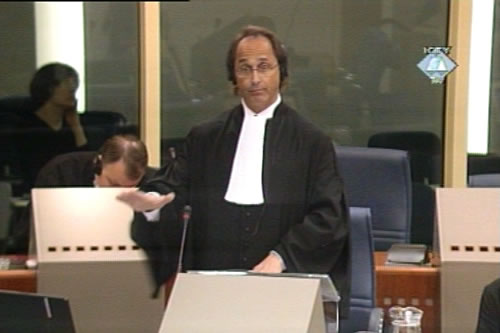Home
DEFENCE OPENS IN THE SREBRENICA CASE
In his opening statement, defense counsel for Vidoje Blagojevic announced that he will try to prove that the accused "did not participate, directly or indirectly, in any crime" committed before, in the course of, or after the fall of the Srebrenica enclave.
 Michael Karnavas, defence attorney of Vidoje Blagojevic
Michael Karnavas, defence attorney of Vidoje Blagojevic Defense lawyers for Vidoje Blagojevic, former commander of the VRS Bratunac Brigade, started presenting their case. They will try to prove that their client "did not participate, directly or indirectly, in any crime" committed before, in the course of, or after the fall of the Srebrenica enclave.
Blagojevic is indicted for crimes against Bosniaks who were detained, maltreated and killed in the area of his brigade’s responsibility--including Potocari--and for crimes against detainees who were transferred from the Bratunac area to other locations where they were killed.
Over the next two months, the defense will be presenting evidence that “at no time was Vidoje Blagojevic a participant in a joint criminal enterprise" whose purpose was to expel and kill the Bosniak population in the enclave. "We will present evidence which will show that the [VRS] attack on the Srebrenica enclave was necessary and militarily viable and that the enclave was used as a base from which crimes against the Serbian population were committed," said defense counsel Michael Karnavas in his opening statement. He said that the "attack was necessary to stop the atrocities." Karnavas claims the objectives of Operation Krivaja 95 – which Blagojevic's brigade took part in as part of the Drina Corps – were "of limited nature." He will try to prove that the capture of the town of Srebrenica had not been planned as a part of the operation, but that "it happened unexpectedly."
“In the course of the attack on Srebrenica, who would have thought that the Muslim forces would leave their positions and head towards Tuzla? Who would have thought that the Dutch Battalion would suffer a total breakdown and that the UN would not intervene!?” asked Karnavas rhetorically.
The defense claims that Blagojevic did not know in advance that a crime would be committed against Bosniaks and cannot therefore be held responsible for complicity in genocide. In order to prove the responsibility of an accused for genocide, the prosecution has to show that he had the "intent" to commit it. Using evidence presented by the prosecution itself, the defense states that mass executions began only after Ratko Mladic lost his temper on 13 July 1995 at the Drina Corps Headquarters, shouting "Kill them all!"
The defense will further try to prove that members of the Bratunac Brigade who were seen at the crime scenes were there by chance and not according to orders issued by Blagojevic. Karnavas concluded his opening statement claiming that the case of Vidoje Blagojevic’s responsibility – both individual and command – is based solely on hearsay evidence.
Blagojevic was arrested in an SFOR operation in August 2001. The trial began on 14 May 2003 with the prosecution case. The prosecution rested its case in February 2004. In the dock with Blagojevic is Dragan Jokic, who was in charge of the engineer corps in the VRS Zvornik Brigade. His defense is set to present its case after Blagojevic. The other two co-accused, Dragan Obrenovic and Momir Nikolic, pleaded guilty and were sentenced to 17 and 27 years in prison respectively.
